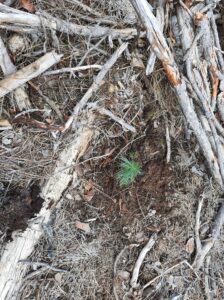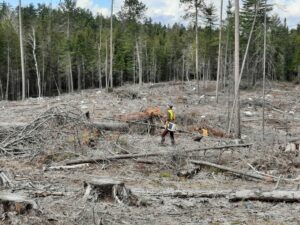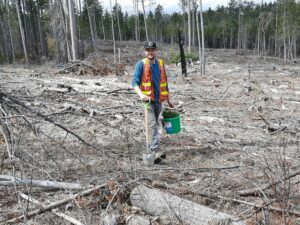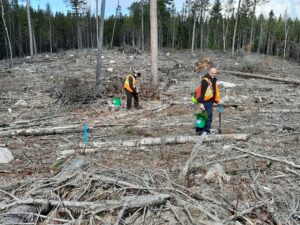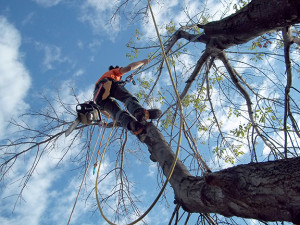Forestry is weaved into the tapestry of the Ottawa Valley. For hundreds of years, the abundant forests that attracted Samuel de Champlain have provided a livelihood in an industry one of the largest drivers of Renfrew County’s economy.
Not surprisingly, the Forestry Technician program is the longest-standing full-time program offered at Algonquin College’s Pembroke Campus. It started in 1968, only a year after Premier John Robarts and his education minister Bill Davis created Ontario’s publicly funded college system. Since those early days, the Pembroke Campus has been among a small group of post-secondary schools in Ontario that have produced thousands of Forestry graduates.

Students in the Forestry Technician program at Algonquin College’s Pembroke Campus show their silver rings from the Canadian Institute of Forestry.
Recently, the class of 2024 completed its program of study and celebrated the occasion by receiving their silver rings from the Canadian Institute of Forestry. It’s a big deal for the students. This time-honoured tradition started in 1953 when a group of forestry and forestry engineering graduates staged their own ring ceremony at the University of British Columbia. By 1961, three other Canadian universities with forestry schools also handed out rings.
It wasn’t until 1967 that the CIF took on the ring ceremony as a project to mark Canada’s Centennial celebrations. For many years, the rings were only available to university graduates, but in 2002, technical colleges that offered forestry programs were added. The ring is now well-engrained as a symbol of success for students at Algonquin College who complete their forestry program.
Over the years, the curriculum has changed to reflect the new and future challenges that face the forestry sector. The recent wildfires in Alberta that forced the evacuation of thousands of people, leaving a trail of destruction and millions of dollars in damage to the tourist-friendly community of Jasper, is an example of the devastating consequences of a forest fire. Sadly, these fires are happening more often.
Climate change and environmental concerns, including the protection of wildlife and the demand for wood products to support housing needs across the country, emphasize the necessity of managing our forests well. Canada remains rich in natural resources, and trees are among the most renewable of those resources. Still, managing forests has become more complex with urban sprawl, a warming earth and labour shortages that have put tremendous strain on the industry.
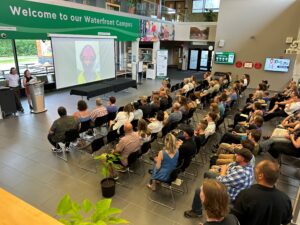
Families joined students as silver rings were presented as part of a program completion ceremony for Algonquin College’s Forestry Technician program.
During their silver ring ceremony, the students were reminded of the opportunity that had been presented to them to make a difference in their careers. As awards were presented to students who had achieved strong academic results in their program or had played a significant role in contributing to the overall success of their classmates, a long list of industry supporters was mentioned for having donated funds so the students could receive their rings at no cost. The message was clear: The forestry industry sticks together and welcomes new graduates to ensure the sector remains strong.
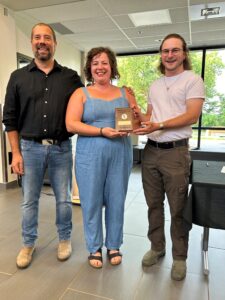
Student Jared Wiles receives the Canadian Institute of Forestry Gold Medal from past Forestry graduate and CIF member Sionaid Eggett and Forestry program coordinator Peter Arbour.
The ring comes with a commitment to live by a code of ethics for forestry professionals. Among the principles of that code are to always act in the best interest of the public good, to be true to their profession by being good stewards of the forest, to work in the best interests of their employer or client while performing their duties and to collaborate with other forestry workers in a respectful and supportive manner.
A new group of Forestry Technician students is about to start their program in September. It’s a full class of 50 students. Over the next 12 months, they will spend a lot of time in local forests, including time at the Shaw Woods Outdoor Education Centre, Algonquin Park, Petawawa Research Forest and local woodlots. Between field trips, they will dig into theory classes in their forestry lab on campus. During that time together, they will become friends, a close-knit group of students who can look forward to their silver ring ceremony and the opportunity to join a special fraternity in one of Canada’s oldest industries.
Posted by: Jamie Bramburger is the Interim Dean of Algonquin College’s Pembroke Waterfront Campus.
